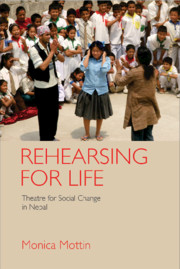Book contents
- Frontmatter
- Dedication
- Contents
- List of Tables, Figures and Boxes
- Acknowledgements
- Chapter 1 Theatre and Life: Theatre at the intersection of art, politics and international development
- Chapter 2 Spacing Out to Speak Up: Resistance, protest and the emergence of street theatre
- Chapter 3 The Streets Become the Stage: Performance, protest and theatre in a time of political crisis
- Chapter 4 Kachahari Natak: Fragments of an aesthetics of theatre for social change
- Chapter 5 Activism not Development Work: Explorations in Tharu kachahari natak
- Chapter 6 A Cultural Army for a Cultural Revolution: Maoist cultural programmes and revolutionary theatre
- Chapter 7 The Ordinariness of the Special: Towards the professionalization of theatre work
- Chapter 8 Conclusions
- Bibliography
- Index
Chapter 7 - The Ordinariness of the Special: Towards the professionalization of theatre work
Published online by Cambridge University Press: 05 April 2018
- Frontmatter
- Dedication
- Contents
- List of Tables, Figures and Boxes
- Acknowledgements
- Chapter 1 Theatre and Life: Theatre at the intersection of art, politics and international development
- Chapter 2 Spacing Out to Speak Up: Resistance, protest and the emergence of street theatre
- Chapter 3 The Streets Become the Stage: Performance, protest and theatre in a time of political crisis
- Chapter 4 Kachahari Natak: Fragments of an aesthetics of theatre for social change
- Chapter 5 Activism not Development Work: Explorations in Tharu kachahari natak
- Chapter 6 A Cultural Army for a Cultural Revolution: Maoist cultural programmes and revolutionary theatre
- Chapter 7 The Ordinariness of the Special: Towards the professionalization of theatre work
- Chapter 8 Conclusions
- Bibliography
- Index
Summary
Despite playing around with the blurred boundaries between onstage representations of life and real-life performative acts, setting performances in non-traditional, real-world locations, or by using participatory and interactive dramaturgical techniques, the theatrical performances that have been discussed so far are usually characterized by a time and space separation from everyday life. They occur in specifically defined places such as cultural programmes, theatre halls, community spaces, schools or streets that are temporarily occupied. At the end of the play or programmes the ‘boundaries’ and the ‘roles’, which may have been reversed during the performance, are reinstated. Aarohan artists are professionals and they remain the ‘specialists’ of the theatre. For the audience the performance represents ‘an experience’ (Turner, 1986) and remains ‘special’ because of its intensity. However, for theatre workers who ‘make’ theatre and live in and through theatre, theatre is indeed very much embedded in everyday life, in its concerns and struggles. The dramatic metaphor is reversed: ‘theatre is life’, artists often repeated in Gurukul, but what did a life fully dedicated to the theatre look like in mid-2000s Nepal?
This chapter explores the development of Aarohan Theatre Group as an organization, including artists’ motivations to turn their passion for theatre into a full-time job and their efforts to strengthen and define their professional identity. Studies in the field of the anthropology of organizations suggest that institutions are shaped by official and informal rules which are monitored and controlled by leaders through ‘conscious disciplinary process’ and division of labour (Morgan 1990 cited in Gellner and Hirsch, 2001, 3). Organizations are represented as having a specific ‘identity’, a ‘shared governing ethos’ (Ibid. 4). They also work in relation to the wider context that ‘provide[s] them with the aims they pursue and set the limits to the way they may operate’ (Ibid.). But how is identity and meaning negotiated within a theatre group trying to become an organization? Anthropological studies have questioned monolithic understandings of organizations (Hilhorst, 2003; Mosse, 2005a; Long and Long, 1992; Gellner and Hirsch, 2001). Studying organizations requires first understanding their internal diversity, and second, locating them culturally and historically.
- Type
- Chapter
- Information
- Rehearsing for LifeTheatre for Social Change in Nepal, pp. 209 - 246Publisher: Cambridge University PressPrint publication year: 2017



